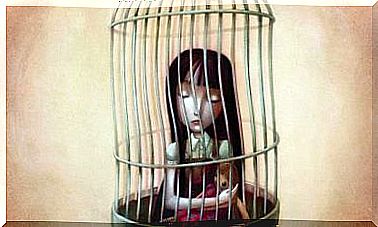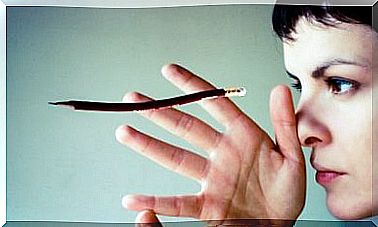How To Eliminate The Need For Approval

We all, to a greater or lesser extent, need our dose of external approval, since we are social beings by nature. However, there is a line that separates the healthy from the pathological in the context of relationships and that we must take into account, if we do not want to establish ties of dependency.
In fact, there are people who seem to have an urgent need to endorse their actions through others. When you are afraid to be original, genuine, in short, to be yourself, to obtain the approval of others, there is a problem.
You must take into consideration that the opinion of others is sometimes also influenced by others. Therefore, it is fickle, anonymous, and whimsical.
As Steve Jobs said “don’t let the noise of other people’s opinions drown out your inner voice.” A wise phrase that is easy to understand, but difficult to put into practice, since as a general rule, human beings want to please and be flattered. The question is to find a balance to avoid that personal well-being depends on the opinion of others. Let’s dive into the need for approval.
The need for approval from birth
To understand why some adults are dependent on approval, we must go back to childhood. In the early stages of life we need external approval, that is, that sense of security that attachment figures provide. In fact, if we don’t get their approval, we’ll likely develop self-esteem issues.

If a mother tells her son that he is a disaster, does not trust him and instead of seeing his virtues, focuses on the defects, this child when he grows up will have a weakened self-esteem and will seek in others that approval that he did not receive. But you do not always grow up with low self-esteem due to family evaluations, since the opinions of classmates, friends or teachers also influence.
According to Vernieri (2006), self-image is the positive acceptance of what is reflected to others, which is based on personal experience and self-care and which is built throughout life, from lived experiences and relationships with others.
However, it is logical that even in adulthood some approval is sought, since it reaffirms and gives security. However, the line between healthy approval seeking and problematic is a fine one. One way to identify where we are is to analyze whether our decisions and behaviors vary according to outside opinions.
When does the need for approval become dependency?
We could speak of dependency when we hand over the reins of our life to others, when our well-being depends on their opinions and evaluations. The question would be, do we want or need the opinion of others?
Next, we explain 5 attitudes of alarm that could indicate that we are dependent on external approval:
- Give a different opinion and do not disagree, but try to be nice to please and not anger the person who has an opinion different from ours.
- Vary our emotional state according to the opinion of others. If they compliment us and approve of us, we feel euphoric and happy, but if they criticize and disapprove of us, we feel sad and unworthy.
- Not knowing how to say “no” and putting doing favors for others before listening to our needs.
- Excessive preoccupation with looking good. It is one thing that we like to groom ourselves and do it often, and another that it becomes a necessity and they cannot see us disheveled, without makeup or with an appearance that we consider to be unhealthy. People who do not have a need for approval have no problem showing themselves without fixing, since they do it naturally.
- Not being spontaneous or authentic for fear of rejection. If before society we show ourselves too correct and lose our naturalness and spontaneity, it could be that deep down we are afraid of being rejected. Therefore, we try to go unnoticed, to avoid receiving criticism.

How to eliminate that need for pathological approval?
We can eliminate the need for approval by changing our thoughts and beliefs. It is not enough to understand it, but it is necessary to reflect thoroughly and believe in the following points:
We can’t like everyone
Whoever you are, whatever virtues you have, you will never be liked by everyone. There will always be people who criticize and disapprove of us, and that will happen to every human being on this planet. Therefore, needing to be liked by everyone is impossible.
Even the most recognized artists have their detractors. The Beatles, considered one of the best groups in history, do not like everyone. The same happens with Picasso, Miró, Dalí, Mondrian, Kandinsky, etc. Also with writers like Bukowski, Kerouac, Wilde … No matter how well known we are, no matter how many followers we may have, there will be someone who will not like what we do, and that should not disturb us, since taste is subjective.
Nobody knows us like ourselves
Another wrong thinking is to believe that others are in possession of the truth. People in need of approval believe more in outside opinions than their own.
Nobody knows us as well as we do, and it often happens that wrong opinions are formed without rational basis. Therefore, we should not give so much power to what others think of us, because they can be wrong. Only we ourselves are the ones who can have stable criteria of self-concept.
Make your decisions
Every time we have to make a decision, we should ask ourselves this question, based on what are we making this decision? Are we influenced by the opinion and desires of others? What do we want, if we put aside social opinion? Decide on your own criteria, not on anyone else’s.
We are neither more nor less than anyone
We are neither more nor less valuable than others. We are all the same, no matter how successful we are, our possessions, or our self-confidence. The only important thing is who you are as a person, the human values that define you.
Disapprovals do not mean rejection
Usually, any criticism is taken as a disparagement of our person, when in reality it is often a rejection of a taste, way of life, opinion, etc … For example, someone could disapprove of another for a musical taste or for political reasons. That does not mean that they are rejecting us as a person, but that it is a matter of not getting along in tastes.
María Nieves Vera (2009), professor at the Department of Personality, Evaluation and Psychological Treatment at the University of Granada, gives us a few keys to positively accept criticism :
- React calmly to criticism to put our patience into practice and learn not to feel attacked.
- Learn to control our negative emotions.
- Reflecting on the fact that a criticism is only an opinion and therefore should not put our self-esteem at stake.
- Take advantage of a criticism to evaluate if it is really good (constructive) or is it an attempt at manipulation.
- If the criticism is good we can take advantage of it and learn from it, instead of spoiling our relationship with the person who has made it to us.
- It is also the case that the criticism is accurate but the words are painful. In this situation, we can take advantage of it and teach the person who has criticized us another more correct way to express his opinion.
- In case they try to manipulate us, the best way to thwart the other person’s plans is to react calmly.
- Reacting in an irascible way can show our weaknesses to the other person. So once again, better to stay calm and relaxed.
- If the criticism is correct, we learn from it ; if it is not, reaffirm ourselves in our position, always from the calm.
- Staying calm allows us to emerge victorious from a situation that usually turns unpleasant.
Often, criticism of mistakes made is taken as a disapproval of the person, when in reality it has nothing to do with it. What has been rejected was simply a wrong way of acting, but that mistake does not define a person, since every human being makes mistakes and evolves thanks to them.
Those who do not seek or need it tend to have more approval

Paradoxically, people who do not think about approval tend to be more accepted than those who seek it. The explanation would be that they tend to like the authentic, although it does not coincide with our opinions, more than the submissive and delivered.
Boost your self-esteem
One of the biggest causes of the need for approval is weak self-esteem. Reinforcing it will help us to improve the problem. When we think that we are valuable people and have a positive opinion about ourselves, disapproval will not hurt us so much, we will see it as something natural that happens in life and we will realize that the essential thing is to believe in oneself despite what that happens abroad.
Accept differences between people
We are not all the same, we each have our tastes, opinions, way of life, etc. Being different does not mean being better or worse. We will meet opposite people with whom we will not get along, but we should never see that as disapproval but as difference.
Photograph courtesy of Svetlana Undalova









